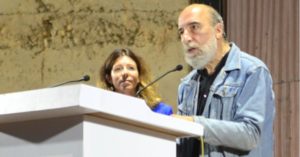Random
“the limitless violence of beauty”: On Raúl Zurita
In the comment to my last post, “Deadgod” raised some good issues about “canons” and canonical thinking. When I disparage canonical thinking, I am disparaging the kind of stable lists and established readings that aims to contain poetry’s volatility. But I’m not opposed to people having favorite poets, or even of people promoting certain poets as great.

In his blurb to Anna Deeny Morales’s new selection of Raúl Zurita’s work, Sky Below: Selected Works, Forrest Gander writes: “There isn’t a more important contemporary writer than Raúl Zurita.”
I think this statement could be more than a blurb, I think it can model a very insightful mental exercise: Instead of assuming that a US poet – Ashbery, Bishop etc – is “the most important post-war poet” (as tends to be the assumption in US discussions about poetry), imagine an alternative reality (not all that alternative, if you happen to live not in the US but in Chile or any other part of the Spanish-speaking world) that Raúl Zurita is the most important contemporary poet.
How would that change all kinds of assumptions about poetry?
For example, in Zurita’s work lyrical poetry and politics are not opposed, as in so much US thinking about poetry. The lyrical is political; the lyric also has the capacity to embrace the public, the visionary, dreams, the abject; the lyrical can be excessive and overwhelming, not a call to be moderate/”incremental” and “write what you know”; the avant-garde is not to be obscure or elite, but to be dramatically populist (as it was for example for the Dadaist poster-makers in Germany, 1930s). I think especially in times such as this, Zurita’s fierce work – embracing performance work as well as lyrics – is a great source of inspiration for me.
From an interview with Prairie Schooner:
“All that I came to do in those years, like the art actions with the CADA, was because I felt that pain and death should be responded to with a poetry and an art that was as vast and strong as the violence that was exercised over us. To place in opposition the limitless violence of crime and the limitless violence of beauty, the extreme violence of power and the extreme violence of art, the violence of terror and the even stronger violence of all our poems. I never knew how to throw stones, but that was not our intifada. You can’t defeat a dictatorship with poetry, but without poetry, and this is no metaphor, humanity disappears, literally, in the next five minutes.”

However, I think calling attention to the greatness of Zurita is only good if we do away with the common treatment whereby foreign writers are “allowed” to write about political calamity but that conditions are different for US poets (as in many discussions about “the poetry of witness” etc). Or that Zurita stands for a kind of separate, quarantined, foreign canonicity. That’s stabilizing canonicity.
No, I think we should insist – with Gander – that Zurita is someone for US poets to take to heart as much as they take to heart US poets, or even more than they take to heart US poets. This is one of the threats and promises of translation’s “transgressive circulation”: that a foreign poet can be “canonical” and utterly challenge our assumptions about poetry.
In an increasingly untenable situation in this country, I am inspired by Zurita’s call for a poetry that is “as vast and strong” as the forces of injustice, a call for an “extreme” poetry that invokes and engages with “the limitless violence of beauty.”

a) Agreed, that stability and establishment are to be, at least, questioned—and often, specifically, rejected—, as to what relations of force their assumption conceals. I’d add, though, that canonicity is an institutionalization of both stasis and unity and volatility and fracture/rupture. I don’t think contest is, as it were, forced into a canon; contest is ineradicable from the connective tissue of a canon itself. (As exemplary, I’d name the fortunes of reputation of Donne and the 17th-c. ‘conceited’ poets in the canons of English poetry and the English language. That would be the first in my canon of canon-formation self-difference, ha ha.)
A community is shaped by a diversity of opinion about, say, what’s ‘great’ in literature, just as each reader’s mind changes about a definition and examples of ‘greatness’. A majority obtains—and bears minorities of competing perspectives, which might obtain subsequent majority, in dialectical turn with changes in political-economic, social, technological, and other conditions.
I don’t think stability of canons is to be worried about, so much as, simply, tested.
b) I’m curious about where, in American poetry worlds, politics is suppressed in lyric poetry. —not that I’d be astounded to learn about it, but are there writing programs where ‘politics’ is effectively disallowed for the poets? or magazines that openly refuse to publish ‘political’ poem a priori?
c) I’m an American, and I’d name, as “the most important post-war poet”, Paul Celan. …of course, there must be a dozen right answers—or forty.
if someone were unwilling to test the durability of a canonical member could that be either mere temporal stubbornness on the part of the unwilling or in fact a sign of durability on the part of the member ? would you simply argue that no work should ever be assumed to be unimpeachable even if a work could be so durable as to inspire dogmatism in its admirers ?
I guess I should be clear about ‘testing’: if you’re told (in a high school, say, or at HTMLGiant) that a specific writer is X (‘great’, ‘boring’, ‘a metaphysical poet’), I don’t think you can understand the claim except by having begun to test it.
So I’m not sure what you mean by “unwilling to test the durability of a canonical member”. By definition, that would be at least a temporary stubbornness, yes. I mean, it would amount to not being willing to read the thing.
If you mean that a reader were resisting the words ‘member of “the” canon’, I’d appeal to empirical determination: 98% of high schools in America assign Gatsby (made-up statistic, you get the idea). If one thinks particular members of the canon are not validly in it, that person is already testing those members. And if one insisted on being against canon formation—everything is equal to everything else evaluatively—, I’d say, okay. (I wouldn’t believe that person believes what they’re saying, but I’d eventually despair of being the cause of them dedogmatizing themselves about bogey-canons.)
If you mean that durability is what’s questioned, sure, everybody would speak for the future, but somehow, people in the future are going to test what they’re canonically given. That’s what a ‘classic’ is: every generation (or so) vets the thing, and mostly, it keeps mostly passing at some high level.
I’m not impressed by dogmatism in admirers—it’s not much of a recommendation, is it. If someone said, ‘Shakespeare is great. Period.’, I’d reply, ‘Because I’ve read him, I agree. Not for any other reason. What do you mean, “Period.”?’
I’d say that no work is untestable. If someone wants to impeach Shakespeare, go ahead and show me, why not.
i am inclined to dismiss dogmatism in general yet i have doubts about abstract opposition to it . how can one distinguish between the dogmatist and the one who truly believes in the work by way of its intricacies and nuances and whatnot ? i suppose one must talk to them or read their accounts and one might need some understanding of those nuances in order to verify their absence from a dogmatic view . after all not everyone will divulge their full understanding or impression of a work every time it comes up and thank goodness for that . yes ?